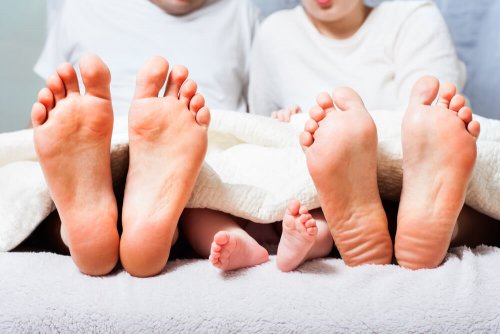Should Children Sleep With Their Parents?

A very frequent question that parents, especially mothers, ask themselves is at what age should a baby start sleeping on their own. Are there benefits to sleeping with parents? What is recommended?
Letting babies sleep with their parents can be a necessity during the first days and months of life, but what happens when they get a little bit older? How long should you let them sleep with you? These and other questions have simpler answers than you may think.
Advantages of sleeping with parents
Nils Bergman, Director of Neonatology at the Maternity Hospital Mowbray (South Africa) says that babies should sleep with their mothers until about 3 years of age.
By observing the sleep patterns of 16 babies, the pediatrician and his team showed that babies who slept alone in their cribs had a stress level three times higher than those who had the company of their mother.
According to Bergman, children who sleep with their parents up to the age of 3 suffer less stress than children who sleep alone.
In addition, it has been observed that babies who sleep alone in the crib experience interrupted sleep cycles, which can clearly affect the child’s normal development. The opposite is true when children sleep with their parents.

It is necessary to take into account the stress that a time of separation may cause in the child. Once you feel that he is ready to sleep alone, you must help him to separate from you with sensitivity, reaffirming his ability to sleep alone in his own space while also making him understand why it is important to become independent.
Beware of stress in infants
We can come to believe that babies never get stressed. That would be ideal, just as it would be ideal if no adult ever got stressed. But reality makes this impossible.
Saying that a baby does not get stressed is the wrong way to convince ourselves that stress is something only grown-ups experience.
Stress forms an active part of the life of every human being, to a greater or lesser extent, and children also suffer stress in the face of certain circumstances.
Babies show stress in the following ways:
- Irritability
- Bad mood
Remember that babies do not know how to dissipate their stress. Whereas an adult can maybe take a relaxing bath, listen to music or play a sport, babies cannot. The only relief and comfort the child will have is that of his parents.
Therefore, you must be sensitive about separation, and make the child’s room a space where he feels safe and confident. Help him to be independent while he rests in the most natural way possible to avoid a traumatic experience.

The final decision is for the parents to make
There is neither a fixed nor clear rule regarding sleeping with parents. Advice will always simply be advice. Every parent knows what’s best for his or her child and seeks to enhance their well-being.
So, it’s up to the parents to decide whether their baby should sleep with them. Some do not see it as an issue, and others prefer to have the child sleep in a crib.
Sudden infant death
Several specialists have recommended babies sleep alone from the beginning and never co-sleep with parents in order to avoid sudden infant death syndrome. While it is true that the exact causes of sudden infant death are still unknown, specialists try to reduce the risks with this recommendation.
It never hurts to take precautions when sleeping with your baby, especially if they are just a few days or months old. Being in their most vulnerable stage of life, we must try not to hurt them with movement, etc.
Try to avoid the following:
- Having very large pillows
- Excessive fatigue, which can cause a lapse in attention or judgement when it comes to meeting a baby’s needs
- Drinking, smoking or using drugs
- Having pets on the bed
- Wrapping the baby too much, since this can affect breathing
This way, parents can give all the necessary care and attention that is so appreciated by their children, who will undoubtedly thank them in adulthood.
All cited sources were thoroughly reviewed by our team to ensure their quality, reliability, currency, and validity. The bibliography of this article was considered reliable and of academic or scientific accuracy.
- Landen, P., Ballesi, M., Uchitel, L., & Freire, M. (2008). Beneficios del masaje terapéutico en bebes prematuros dados de alta de la UCIN. Revista Iberoamericana de Psicomotricidad y Tecnicas Corporales
- Montserrat Galaa, A. M., & Fortes del Valleb, M. A. (2013). Aprender a dormir. Pediatría de Atención Primaria. https://doi.org/10.4321/S1139-76322013000500004
- Landa Rivera, L., Díaz-Gómez, M., Gómez Papi, A., Paricio Talayero, J. M., Pallás Alonso, C., Hernández Aguilar, M. T., … & Lasarte Velillas, J. J. (2012). El colecho favorece la práctica de la lactancia materna y no aumenta el riesgo de muerte súbita del lactante: Dormir con los padres. Pediatría Atención Primaria, 14(53), 53-60. http://scielo.isciii.es/pdf/pap/v14n53/revision1.pdf
- Horsley T, Clifford T, Barrowman N, Bennett S, Yasdi F, Sampson M, et al. (2007). Benefits and harms associated with the practice of bed sharing. Arch Pediatr Ado- lesc Med. 2007;161:237-45.
- Martin Martin, R., Sanchez Bayle, M., & Teruel de Francisco, M. C. (2017). El colecho en nuestro medio: estudio de casos y controles en las consultas pediátricas de Atención Primaria. Pediatría Atención Primaria, 19(73), 15-21. http://scielo.isciii.es/scielo.php?script=sci_arttext&pid=S1139-76322017000100003
- Rodríguez Villar, V., Moreno, M., & Navío, C. PRACTICANDO EL COLECHO. ASESORAMIENTO DE LA MATRONA. http://www.trances.es/papers/TCS%2005_3_6.pdf
- Ball, H. L., Hooker, E., & Kelly, P. J. (2000). Parent–infant co‐sleeping: fathers’ roles and perspectives. Infant and Child Development: An International Journal of Research and Practice, 9(2), 67-74. https://onlinelibrary.wiley.com/doi/abs/10.1002/1522-7219(200006)9:2%3C67::AID-ICD209%3E3.0.CO;2-7
This text is provided for informational purposes only and does not replace consultation with a professional. If in doubt, consult your specialist.








